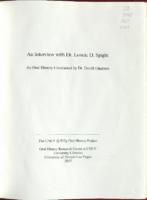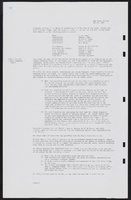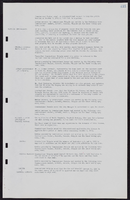Search the Special Collections and Archives Portal
Search Results

Olivia Díaz oral history interview: transcripts
Date
Archival Collection
Description
Oral history interviews with Olivia Díaz conducted by Nathalie Martinez and Barbara Tabach on August 31 and September 14, 2020 for the Latinx Voices of Southern Nevada Oral History Project. In the first interview, Díaz gives her family and personal history, growing up in Las Vegas but often visiting her family in Durango, Mexico for extended stays. She recalls her matriarchal upbringing, particularly while living in Mexico, and what life was like growing up and going to school in East Las Vegas and at the University of Nevada Las Vegas (UNLV). Subjects discussed include: Mexico; Latina identity. In the second interview, Díaz talks about her English language education career for the Clark County School District (CCSD) and the events that led her to run for Nevada Assembly and Las Vegas City Council. She is presently Nevada's Assemblywoman for District 11 and Las Vegas' Councilwoman for Ward 3. Olivia concludes her interview with insights into her political and educational goals for the community and the initiatives she has focused on in light of the COVID-19 pandemic.
Text

Jaime Cruz interview, July 3, 2019: transcript
Date
Archival Collection
Description
Interviewed by Rodrigo Vazquez. Cruz was born in Lima, Peru to Carmen, who retired from CCSD as a teacher's aide, and Jaime, who was a professional soccer player. When young Jaime emigrated to the United States in 1987, it was to join his mother and brother in Las Vegas. The culture shock was significant, but he was undaunted. And, despite his engineering degree, the only employment he could secure was that of dishwasher. Cruz quickly understood the employment barriers that he would encounter and thankfully with the encouragement of mentors he improved his English skills and never omitted his degree from his resume. Eventually, it was noted and the decision to take a position that utilized this training would be one he never regretted. Today Cruz is the Executive Director of Workforce Connections, Southern Nevada's Local Workforce Development Board.
Text
Mario C. Monaco oral history interview
Identifier
Abstract
Oral history interview with Mario C. Monaco conducted by Kim Rhodes on March 12, 1981 for the Ralph Roske Oral History Project on Early Las Vegas. In this interview, Monaco discusses moving from Montana to Las Vegas, Nevada in 1958. Monaco discusses his career in the U.S. Navy as well as his career in education. He also discusses changes in the education system, including the required competency test and changes in attendance policy.
Archival Collection

Transcript of interview with Dr. Lonnie D. Spight by Dr. David Emerson, May 8, 2007
Date
Archival Collection
Description
Text
Felicia Ortiz (Nevada Department of Education) oral history interview conducted by Magdalena Martinez and Kelliann Beavers: transcript
Date
Archival Collection
Description
From the Lincy Institute "Perspectives from the COVID-19 Pandemic" Oral History Project (MS-01178) -- Elected official interviews file.
Text
Richard and Gertrude Rudiak with Dani Ramage oral history interview
Identifier
Abstract
Oral history interview with Richard and Gertrude Rudiak with Dani Ramage conducted by Barbara Tabach on December 30, 2015 for the Southern Nevada Jewish Heritage Project. Richard talks about his father, who was an early Nevada Assemblyman and a civil rights activist. Gertrude discusses her hobby of playing the pipe organ, teaching in both secular and Jewish education, and being on many community boards.
Archival Collection
Rochelle Hooks oral history interview
Identifier
Abstract
Oral history interview with Rochelle Hooks conducted by Rebecca Snetselaar and Binnie Wilkin on April 12, 2016 for the Folklife Program of the Nevada Arts Council and the Oral History Research Center at UNLV Libraries. Hooks begins by talking about who she is and what she does. She explains what storytelling is in the African American community and how she used education to tell them. She describes her experiences with storytelling, the lessons she has learned, and what she appreciates about it. Then, Hooks speaks about important people in the African American community and the impact they had. She talks about the reason she moved to Las Vegas, Nevada, the development of the African American community and arts, and the impacts of storytelling. Lastly, she recalls stories about her family history.
Archival Collection
Nancy Cummings-Schmidt oral history interview
Identifier
Abstract
Oral history interview with Nancy Cummings-Schmidt conducted by Stefani Evans and Claytee D. White on October 18, 2016 for the Building Las Vegas Oral History Project. In this interview, Cummings-Schmidt discusses her family background in Nevada dating back to the 1800s. She talks about her educational experiences in Las Vegas, Nevada and her work as a library aid at Nevada Southern University (now University of Nevada, Las Vegas). Later, Cummings-Schmidt discusses her role as the Young People’s Library Coordinator for the Sunrise Library in 1973 and talks about racism and sexism in children’s literature. Lastly, Cummings-Schmidt describes the technological development and changes in libraries.
Archival Collection


